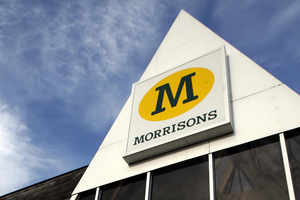 ing the cost of products from broccoli to baby wipes is threatening the credit ratings of U.K. supermarkets as they battle to woo back customers from German discount chains Aldi and Lidl.
ing the cost of products from broccoli to baby wipes is threatening the credit ratings of U.K. supermarkets as they battle to woo back customers from German discount chains Aldi and Lidl.Wm Morrison Supermarkets Plc, the smallest of the so-called big four grocers, predicts profit will fall by about 50 percent after it promised 1 billion pounds ($1.7 billion) of price cuts over three years. Tesco Plc, the largest, has pledged reductions of at least 200 million pounds following a second year of shrinking profit.
“If you only have half the operating profitability, typical credit ratios are simply less favorable,” Sven Reinke, a retail-credit analyst at Moody’s Investors Service, which downgraded Morrison in March, said in an interview on May 9.
Aldi and Lidl have taken more than two percentage points of market share from the big four supermarkets, which also includes Wal-Mart Stores Inc.’s Asda unit and J Sainsbury Plc, as Britons struggling with an unprecedented squeeze on incomes defect for their low-frills offerings. The threat to ratings has pushed up the cost of insuring the debt of Morrison and Tesco against default.
Moody’s cut Morrison to two levels above junk following its announcement of price cuts and said the outlook is negative. Tesco, currently three levels above junk with the main ratings companies, was put on review for a possible downgrade by Moody’s and Standard & Poor’s last month as lower prices weigh on margins.
Negative Pressure
Discounts at Tesco, Asda, Morrison and the Co-operative Group this year will shave about 1 billion pounds off grocery prices. Morrison and Tesco are also trying to guarantee payments to shareholders by opening fewer large stores to boost cash flow.
“If you increase shareholder dividends significantly and your operating profitability deteriorates, your credit profile could be under negative pressure,” said Reinke. “If an issuer doesn’t have sufficient free cash flow to continue to pay high dividends and maintain a strong credit profile, they would need to prioritize between shareholder remuneration and protecting the credit profile.”
Tesco’s pound bonds included in the Bank of America Merrill Lynch BBB sterling corporate non-financial index handed investors 4.4 percent this year, compared with an average of 5.7 percent among the top 50 issuers.
Investors demand 157 basis points more yield to hold Tesco bonds maturing in 2023 than benchmark government debt, versus an index average of 144 basis points. Morrison bonds due the same year yield 175 basis points over the benchmark.
Worst Performer
Morrison is the worst-performing of 125 investment-grade companies in the Markit iTraxx Europe Index of credit-default swaps this year. The contracts have risen 95 basis points to 165. Tesco swaps have climbed 21 basis points to 94.
“Our rating remains investment-grade and we continue to have one of the strongest balance sheets among European retailers,” Morrison said in an e-mailed statement. “Moody’s recognizes our commitment to reducing capital expenditure, to significantly improving our working capital position and to reduce our net debt this year below 2.5 billion pounds. Improving our investment-grade rating remains a central part of our financial strategy.”
The supermarket industry is going through a period of “unprecedented change” that “underlines the importance of our strategy to deliver the most compelling offer for customers,” Tesco said in an e-mailed statement.
While Tesco operates in 12 markets, about three-quarters of its profit comes from the U.K., its home market.
Trading Margin
Its U.K. trading margin will drop to 4.4 percent this year from 5 percent in 2013, while Morrison’s will decline to 2.9 percent from 4.5 percent, Barclays Plc retail analyst James Anstead estimates.
Both retailers have also pulled back from opening more large supermarkets as shoppers increasingly buy their groceries online and top up at smaller convenience stores.
Tesco has committed to reducing capital spending to no more than 2.5 billion pounds a year from 3 billion pounds last year and a 2009 peak of 6.6 billion pounds. Morrison has cut its capital expenditure by half to 550 million pounds after starting its online grocery service this year and accelerating the rollout of its nascent convenience-store business.
Price King
The companies are banking on online, convenience stores and loyalty cards combined with rock-bottom prices attracting shoppers back from the discounters, which only operate supermarkets and offer limited ranges. For now, price is king.
In the 12 weeks to April 27, Aldi and Lidl saw sales rise a record 36 percent and 21 percent, respectively. They command a combined 8.2 percent share of the 170 billion-pound U.K. grocery market, up from 6.5 percent a year ago, researcher Kantar Worldpanel said May 7.
Tesco’s market share dropped to 28.7 percent from 30 percent, while Morrison’s declined to 11 percent from 11.6 percent, with both retailers posting falling sales. Morrison shares are down 18 percent this year, the sixth-worst performer in the FTSE 100 Index. Tesco shares have lost 7 percent. The benchmark index has risen 1.2 percent.
“We would expect further negative rating news-flow from the agencies on Tesco and Morrison in particular,” said Rob Orman, a retail analyst at Henderson Global Investors Ltd. in London, who rates Tesco and Morrison “underweight.” That’s likely to put pressure on bond spreads and credit-default swaps, he said.





